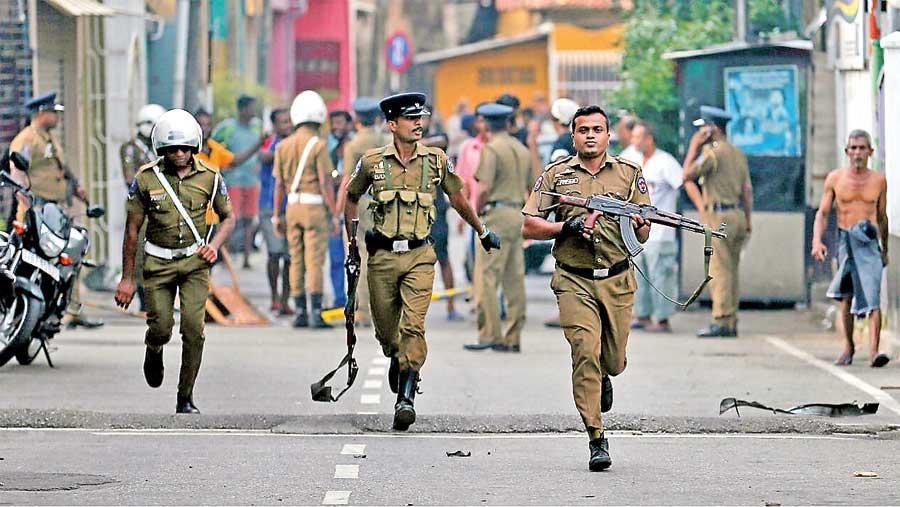Reply To:
Name - Reply Comment

- All stakeholders in society should work together for the Police force to be effective
- Police alone cannot function to curb crime
- Tasks of Police rests on Executive, Legislature and Judiciary
Excerpts from an article written to the Voice of Professionals of the AOPA of Professional Associations (OPA) of Sri Lanka published in November 2019.
In every civilized society, a Police system exists for the common good of the entire community. The world over, the primary duty of any Police Force is the prevention and the detection of crime and criminal law enforcement with the view to apprehending perpetrators of crime and collecting evidence against them enabling them to be prosecuted in the Courts of Law and to maintain public tranquillity.
Of course, based on the nature of the structure of the State and its organs and the system of law and justice, the structure and the powers and functions of the Police vary from country to country.
Law and order is the basic foundation of any civilized society. The most fundamental issue for the Police is dealing with the Community. Over time, the tasks of the Police in serving the community have become more complex and extensive. The Police has to accomplish the impossible and therefore has to develop an operating mode that is acceptable to most of the people most of the time. The role of the Police is vastly different from the approaches of other State Apparatus with a divergent “Culture” and an arduous 24/7 duty to perform, which needs to be understood by the Society.
The community most of the time seem to be unaware that they expect the Police to perform an arduous and a difficult task. Moreover, they are often a scapegoat for the community’s social and moral shortcomings as well.
When exercising the primary duty the Police is often criticized for its coercive role, while on the other, its attempts at purely preventive and social work are ill-received.
Due to serious security threats faced by the country as a result of separatist terrorism, the Sri Lanka Police was compelled to assume additional responsibilities for the protection of the State, Sovereignty, its National Leaders, the civilian population and property.
As a result, the number of Police personnel available to perform conventional Police duties such as patrolling for preventing crime, early detection of crimes and receiving intelligence and conducting criminal investigations, became far less than the actual number required to in carrying out such duties and responsibilities effectively.
Be it either the former or the latter reason, the Police alone cannot solve this problem nor the order.
Police certainly could do better with the active participation of the community. The civic community must support compliance with the rule of law, instead of looking to the Police as merely an institution responsible for controlling criminality, public tranquillity and/or Law and order.
The public needs to well understand the importance of good behaviour and obedience to Law and order. This perceptive approach of the public will certainly make the role of the Police relatively uncomplicated to discharge their duties towards enforcement of Law and order. This undoubtedly also would enhance the public trust towards Police.
The Police as the enforcing arm of the Law, it is needless to say that they would welcome public adherence to discipline and observance to the rule of law undoubtedly as pre-requisites, they being the main stakeholders to achieve this objective. This is the most important fabric and foundation, essentially needed if we are to progress as a Nation.
Efforts to prevent crime must, therefore, include the teaching of conventional values. In this context, it is also necessary to find ways to strengthen individual bonds to society, commitment to the conventional order and participation in conventional activities. The best way is to strengthen the Institutions that socialize people and continue to regulate their behaviours throughout life- the family, the school and the workplace. Personal or inner controls are as important as social or external controls in keeping people from committing crimes.
"The Police spend a great deal of time and resources doing it, but most of the operation (task) is done by a motorist who has to abide by the road rules. Hence, the order cannot only be secured through fear of punishment. The members of the public too, have an important role to play to obey the Rules of Law"
Thus, it would be seen that solution to control crime is not only in the hands of the Police. It has a combination of multiple factors, to put it very simply, the public behaviour, their perception; attitudes; more importantly obedience to law, respect for authority, upholding values, investment in customs and traditions – they all too play a major role- a role that will certainly be supportive in the maintenance of law and order by Police. Therefore, Civil society essentially plays a pivotal role and needs to be a driving force to support the Police in the flow of information to curb crime or could group to support crime prevention mechanisms.
In the light of what is said, the conception of its vocation in the field of crime prevention must, at the outset, be shared by all those who are capable of helping the Police either through moral influence in the country or through their professional relations with the Police such as Judges, Sociologists, Criminologists, Social Workers, Probation Officers, and above all by peace-loving citizens.
Policing in a Democratic Society are Public Political functions. These processes emanate from the three divisions of the Government namely, the Executive, Legislature and Judiciary.
All of this is subjected to civilian oversight, with the community finally responsible for all the processes dealing with crime and criminals. What the Police are, what they do, how they do, how well they fulfil the expectations, how professional they are and what improvements they need are political questions, inevitably need to be viewed as pre-requisites for enhancement and enforcement of the Laws.
On the other hand, reinforcements of informal controls on individual behaviour are the most vital way to reduce the incidence of crime. Compliance with most laws does not depend upon the likelihood of them being enforced but upon the acceptance of informal norms and a concern for the feelings of others.
The participation of all social institutions towards the maintenance of peace and public order is a must and they could be partners in systematic crime preventive action through more effective Police Community cooperation, which seriously lack in our country.
Unlike in totalitarian systems, in a democratic society, the Police function depends to a considerable degree through self-policing by every citizen. This dictum comes into play a pivotal role as law observance is the most salient part of Law Enforcement. Traffic Management is a case in point.
The Police spend a great deal of time and resources doing it, but most of the operation (task) is done by a motorist who has to abide by the road rules. Hence, the order cannot only be secured through fear of punishment. The members of the public too, have an important role to play to obey the Rules of Law.
Ironically with the social changes, the approach of the Police in dealing with Law and Order has to be generally one of professional development, including elevation of recruitment standards, extensive training covering a wide range of subjects including Police community relations, strengthening against submissions to the demands of politicians and expansion of specialized training, resources to some degree and gradual emergence of Police community relations.
Unlike in the past, a large number of today’s youth do not submit to traditional behaviour controls, in or out of schools. Problems of discipline loom large in and around classrooms. School behaviour, to say the least, especially at the upper levels, is often marginally, criminal, often violent, as many witnesses during big matches and newly emerged ‘demonstration culture’, turning dangerous and frightening.
Therefore, the maintenance of order continues to be important in a school setting. The fact is that if anger or hostility is accompanied by a physical attack upon school staff, fellow students or property, as witnessed in school demonstrations in recent times, the optimum atmosphere for teaching or learning is bound to rapidly deteriorate. Teachings at school levels and homes and improving the quality of instructions and monitoring the activities and behaviours of students will improve the discipline and order to make children be good citizens.
Therefore, mutual assistance among the various components of the society will certainly encourage the Police to become more functional. The best solution is to have only one urge and that should always be allowed to exist; the urge to live in peace. In this context, not only the Police but the people too have a vital role to play.
Constructive criticism must come by the way to improve the efficiency of the Police but certainly not in the way of destructive criticism to incapacitate and/or ridicule its image.
What it means is that the responsibility of an efficient Police Force is two-way; It needs public support and participation to deter offenders working against society.
They must be the ones who are the major reporters of crime, witnesses of crime and accusers of wrong doers-they are the information sources for Police to act swiftly for the benefit of the community at large.
Citizen involvement in crime prevention and control cannot be considered an unrealistic expectation in today’s context; many citizens are apathetic and prefer that Police alone be responsible for maintaining Law and order. Citizens must, therefore, should not forget the fact that all policing is community policing and the job of the Police will be easy if the citizens obey the rules of Law.
Abraham Maslow has said that “when one’s only tool is a hammer, every problem looks like a nail”. The public participation in assisting the Police is two folds: to be disciplined and to cooperate with the Police in the prevention of crime and the preservation of public tranquillity. The creation of this kind of community requires a collaborative effort by all social agencies as a complementary option to conventional Law Enforcement.
The writer is a Former Senior Deputy Inspector General of Police, Commission Member National Police Commission, President-Association of Chiefs of Police, Vice President-Organization of Professional Associations of Sri Lanka, Actg. President & Secretary-General International Police Association (IPA) -Sri Lanka and Senior Advisor IPA Asian Affairs Bureau- Macau.